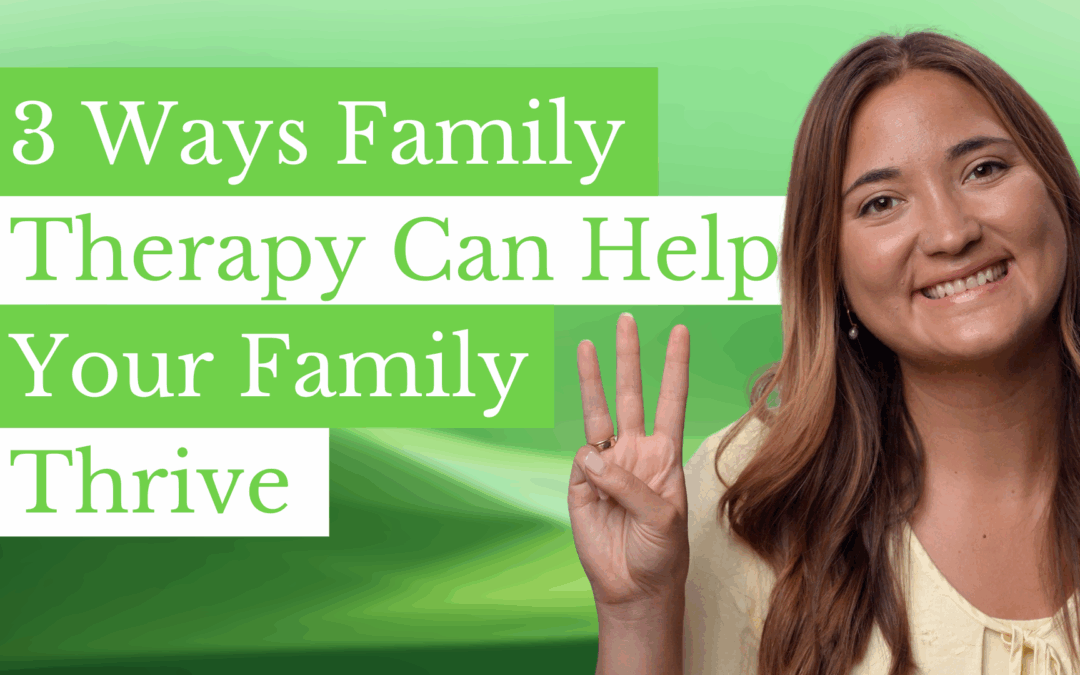Navigating family relationships can be incredibly difficult and discouraging. You may love each other deeply, but daily interactions feel strained, disconnected, or even chaotic.
Patterns of behavior repeat themselves, and no matter how hard you try, things don’t seem to change.
If you’ve ever thought “We don’t know how to move forward”, you’re not alone.
Hi, I’m Sophie Hill, a Therapist at Kid Matters Counseling. As a clinician trained in family systems, I believe that family therapy can provide a unique context for addressing and resolving “stuckness” in families.
As a therapist trained in family systems, I’ve worked with families facing everything from anxiety and conflict to grief and emotional distance. And while the challenges may vary, I believe that family therapy can provide a unique context for addressing and resolving “stuckness” in families.
Here are three powerful ways family therapy can help your family break free from what’s not working, and move toward connection, healing, and hope.
1. Precious Connection Time
Every parent knows the challenge of carving out meaningful time together. Whether your family is navigating nap schedules and diaper changes or balancing soccer practices and screen time, it can feel nearly impossible to slow down and truly connect.
Yet research consistently shows that quality parent-child interactions, including shared play and focused one-on-one time, are crucial for a child’s emotional, social, and cognitive development.
Family therapy creates a consistent, protected space where the focus is entirely on the family: no distractions, no outside noise. During this time, families not only engage with each other differently, but also learn practical tools they can carry into daily life.
2. A Fuller, More Honest Picture
Individual therapy is incredibly valuable. It provides a safe place for children to work out challenges in the safety of a one on one therapeutic relationship, but it only tells part of the story.
Your child may be learning helpful tools in a one-on-one setting, but those tools can fall short if the broader family system isn’t also shifting. Family therapy instead provides a fuller picture of how each family member has a role to play, allowing us to see how each person’s thoughts, behaviors, and emotions interact and influence one another.
3. Real-Time Opportunities to Try Something New
Clinicians can offer feedback and support to parents or individuals in the therapy room, but there can often be hindrances to employing that feedback later in the week in the home setting.
In family therapy, you won’t just talk about challenges, you’ll experiment with new ways of interacting right there in the room. That might mean shifting how we move our bodies and sit together, or coaching through different ways of talking or playing together.
This practice can help support long term change and resolutions to relational stuckness.
Family therapy isn’t always easy. It requires vulnerability, commitment, and patience. But the reward is worth it.
When your family shows up consistently, learns to see the bigger picture, and takes the brave step of trying something new, you create space for lasting healing and growth.
If you’re curious about how family therapy could serve your family, don’t hesitate to schedule an appointment today. Together, we’ll begin mapping a path toward connection and healing.

Sophie Hill
Child Therapist
With my extensive training and practical experience, I offer a unique blend of therapeutic techniques tailored to your child’s needs.
New Clients Call: (855) 586-1802
Current Clients: (855) 543-7687
Ask Us Anything!
We help anxious kids and frustrated parents. We serve Hinsdale & the Western Suburbs of Chicago.
Made with ♥︎ in Hinsdale, Illinois for Chicago
Built By Brand Your Practice.
Kid Matters Counseling, P.C. DISCLAIMER: This website and blog are for informational, educational and general discussion purposes only. It is understood that no guarantee or warranty arises from the information provided, discussed or commented upon in this website and blog nor does it constitute legal or other professional advice on any subject matter. Access to this website and blog is voluntary and at the sole risk of the user. If you think that you have a medical emergency (including clinical), call your doctor or 911 immediately. A licensed medical professional should be consulted for diagnosis and treatment of any and all medical conditions. While the information contained within this website and blog is periodically updated, no guarantee is given that the information provided is correct, complete, and/or up-to-date. See our complete Privacy Policy and Terms of Service.





